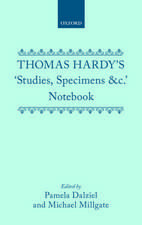Johnson's Shakespeare: Clarendon Paperbacks
Autor G. F. Parkeren Limba Engleză Paperback – 15 aug 1991
Din seria Clarendon Paperbacks
- 18%
 Preț: 336.35 lei
Preț: 336.35 lei - 24%
 Preț: 366.22 lei
Preț: 366.22 lei - 17%
 Preț: 425.43 lei
Preț: 425.43 lei - 24%
 Preț: 385.34 lei
Preț: 385.34 lei - 23%
 Preț: 426.97 lei
Preț: 426.97 lei - 37%
 Preț: 643.99 lei
Preț: 643.99 lei - 11%
 Preț: 359.06 lei
Preț: 359.06 lei - 23%
 Preț: 425.33 lei
Preț: 425.33 lei - 37%
 Preț: 649.01 lei
Preț: 649.01 lei - 19%
 Preț: 506.73 lei
Preț: 506.73 lei - 15%
 Preț: 279.98 lei
Preț: 279.98 lei - 19%
 Preț: 500.10 lei
Preț: 500.10 lei - 34%
 Preț: 340.65 lei
Preț: 340.65 lei - 31%
 Preț: 470.11 lei
Preț: 470.11 lei - 19%
 Preț: 436.25 lei
Preț: 436.25 lei -
 Preț: 322.61 lei
Preț: 322.61 lei - 16%
 Preț: 247.52 lei
Preț: 247.52 lei - 15%
 Preț: 333.17 lei
Preț: 333.17 lei - 24%
 Preț: 407.13 lei
Preț: 407.13 lei - 31%
 Preț: 392.30 lei
Preț: 392.30 lei - 24%
 Preț: 380.71 lei
Preț: 380.71 lei - 16%
 Preț: 312.81 lei
Preț: 312.81 lei -
 Preț: 305.14 lei
Preț: 305.14 lei - 14%
 Preț: 355.00 lei
Preț: 355.00 lei - 27%
 Preț: 274.73 lei
Preț: 274.73 lei - 24%
 Preț: 504.11 lei
Preț: 504.11 lei - 8%
 Preț: 341.72 lei
Preț: 341.72 lei - 15%
 Preț: 256.13 lei
Preț: 256.13 lei - 18%
 Preț: 272.49 lei
Preț: 272.49 lei - 11%
 Preț: 504.31 lei
Preț: 504.31 lei - 41%
 Preț: 202.64 lei
Preț: 202.64 lei - 30%
 Preț: 611.20 lei
Preț: 611.20 lei - 23%
 Preț: 342.29 lei
Preț: 342.29 lei - 24%
 Preț: 365.66 lei
Preț: 365.66 lei - 14%
 Preț: 334.18 lei
Preț: 334.18 lei - 24%
 Preț: 347.24 lei
Preț: 347.24 lei - 14%
 Preț: 337.64 lei
Preț: 337.64 lei -
 Preț: 331.96 lei
Preț: 331.96 lei - 11%
 Preț: 422.11 lei
Preț: 422.11 lei - 6%
 Preț: 392.03 lei
Preț: 392.03 lei - 14%
 Preț: 353.63 lei
Preț: 353.63 lei - 28%
 Preț: 398.27 lei
Preț: 398.27 lei - 24%
 Preț: 452.38 lei
Preț: 452.38 lei - 34%
 Preț: 570.17 lei
Preț: 570.17 lei - 18%
 Preț: 348.50 lei
Preț: 348.50 lei - 34%
 Preț: 664.24 lei
Preț: 664.24 lei - 11%
 Preț: 421.93 lei
Preț: 421.93 lei - 28%
 Preț: 247.71 lei
Preț: 247.71 lei - 6%
 Preț: 484.29 lei
Preț: 484.29 lei - 11%
 Preț: 399.05 lei
Preț: 399.05 lei
Preț: 223.29 lei
Preț vechi: 350.74 lei
-36%
Puncte Express: 335
Preț estimativ în valută:
39.49€ • 46.34$ • 34.25£
39.49€ • 46.34$ • 34.25£
Carte tipărită la comandă
Livrare economică 12-17 martie
Specificații
ISBN-13: 9780198112716
ISBN-10: 0198112718
Pagini: 226
Dimensiuni: 136 x 216 x 14 mm
Greutate: 0.31 kg
Editura: Clarendon Press
Colecția Clarendon Press
Seria Clarendon Paperbacks
Locul publicării:Oxford, United Kingdom
ISBN-10: 0198112718
Pagini: 226
Dimensiuni: 136 x 216 x 14 mm
Greutate: 0.31 kg
Editura: Clarendon Press
Colecția Clarendon Press
Seria Clarendon Paperbacks
Locul publicării:Oxford, United Kingdom
Recenzii
`not only has Parker written an excellent piece of critical history but also, by design, he has provided an aid to "taking Johnson seriously" as someone with something important to say to us now. As never before, Parker makes Johnson's views on Shakespeare available, in tone as well as content, by relating them to other criticism of its time including his own, testing them against Shakespeare's plays, and contrasting them with the Romantic criticism that followed.' Robert Hapgood, Times Literary Supplement
`distinguished, complex, and subtle ... this is a stimulating book - always highly intelligent but always raising objections, doubts, and queries in the mind.'Essays in Criticism
`a lucid account of the resemblances and differences between the views of Johnson and those of Wordsworth, Coleridge, and Hazlitt ... Parker is here at his best providing many illuminating insights into the plays of Shakespeare'English Studies
`Dr Parker's comparison of the "Johnsonian" and "Romantic" Shakespeare is conducted with a sustained and scrupulous fair-mindedness which makes his championship of Johnson all the more convincing, and which is matched by the aptness of his illustrative examples and the elegant persuasiveness of his critical prose. His book, one of the most intelligent and useful critical monographs to come my way for some time, disposes authoritatively of countless common misapprehensions about, and crudifications of, Johnson's thought.' Review of English Studies
`very helpful book'C.S. Lim, University of Malaya, Notes & Queries, Vol.235, No.37, December 1990
`a fresh and vivid study of the Shakespeare criticism. Its first chapter is entitled `Taking Johnson seriously', and the book is written with an intelligent fervour and a forthright sharpness which do just that ... it's part of the attraction of this book that it `takes seriously' all the older critics with whom it engages.'London Review of Books
`elegant study'Modern Philology
'a helpful view of Shakespeare in the eighteenth century'English Language Notes, June 1993
'Parker gives us many more good insights than bad, and he seldom forces a prior conviction upon the materials he analyses. His book does much to show why we should take seriously Johnson's edition of Shakespeare as a whole, instead of looking upon it as merely an unwieldy appendage to the Preface.'Shirley White Johnston, The Age of Johnson: A Scholarly Annual, Volume 4 (1991)
`distinguished, complex, and subtle ... this is a stimulating book - always highly intelligent but always raising objections, doubts, and queries in the mind.'Essays in Criticism
`a lucid account of the resemblances and differences between the views of Johnson and those of Wordsworth, Coleridge, and Hazlitt ... Parker is here at his best providing many illuminating insights into the plays of Shakespeare'English Studies
`Dr Parker's comparison of the "Johnsonian" and "Romantic" Shakespeare is conducted with a sustained and scrupulous fair-mindedness which makes his championship of Johnson all the more convincing, and which is matched by the aptness of his illustrative examples and the elegant persuasiveness of his critical prose. His book, one of the most intelligent and useful critical monographs to come my way for some time, disposes authoritatively of countless common misapprehensions about, and crudifications of, Johnson's thought.' Review of English Studies
`very helpful book'C.S. Lim, University of Malaya, Notes & Queries, Vol.235, No.37, December 1990
`a fresh and vivid study of the Shakespeare criticism. Its first chapter is entitled `Taking Johnson seriously', and the book is written with an intelligent fervour and a forthright sharpness which do just that ... it's part of the attraction of this book that it `takes seriously' all the older critics with whom it engages.'London Review of Books
`elegant study'Modern Philology
'a helpful view of Shakespeare in the eighteenth century'English Language Notes, June 1993
'Parker gives us many more good insights than bad, and he seldom forces a prior conviction upon the materials he analyses. His book does much to show why we should take seriously Johnson's edition of Shakespeare as a whole, instead of looking upon it as merely an unwieldy appendage to the Preface.'Shirley White Johnston, The Age of Johnson: A Scholarly Annual, Volume 4 (1991)
















